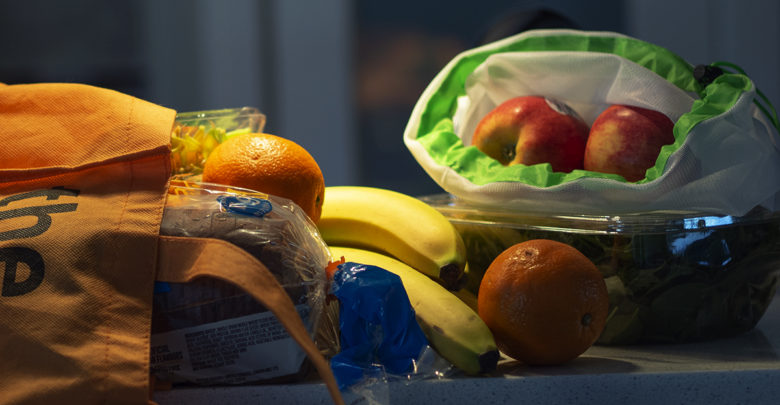Fresh Routes, a not-for-profit mobile grocery store, goes to U of A and local communities
Starting January 20, Fresh Routes mobile grocery store will be at the PAW Centre at the U of A every Monday
 Helen Zhang
Helen ZhangA new mobile grocery store is filling a food access gap in communities around the city.
The Fresh Routes mobile grocery store is a social enterprise not-for-profit that started in Calgary and came to Edmonton in October 2019. They buy produce from H and W, a local produce vendor, at or just above cost, and sell it in communities that might not have access to affordable and healthy food. Currently, they operate at six locations around Edmonton, and plan to start a location in the PAW Centre at the University of Alberta on January 20 — running thereafter every Monday year round from 11 a.m.to 2 p.m.
Morgan Allen, Edmonton lead of Fresh Routes, explained how the organization operates as a social enterprise. Under this model, Fresh Routes has a social cause they want to address while also generating revenue. However, instead of making shareholders profit, the revenue goes back into sustaining their operation. This means once they are established in a community and become financially sustainable, they can stay there indefinitely, and do not have to rely on grants.
“From a community aspect, it’s nice because as people perhaps start to utilise the service, it’s not something that’s going to necessarily be taken away from them once they get used to it,” she said.
Fresh Routes looks to provide access to healthy food in communities

According to Allen, physical and economic access to food are one of the primary objectives of Fresh Routes. The food they sell is less expensive than equivalent foods at grocery stores, and their location in communities makes it easier for community members to access affordable food options.
Fresh Routes is important, Allen explained, because access to food is a fundamental human right, but there are lots of people who can’t access it. There are still gaps in the services provided for food access, as there aren’t a lot of options between free access and grocery stores, she said.
“The mobile grocery store I think fills a really important niche in terms of the price point of the food,” she said. “It’s essentially opening doors for people who may have otherwise been excluded and having to rely on handouts, to start to access food.”
Fresh Routes work in collaboration with the City of Edmonton Community Social Work team and a network of stakeholders in various communities to determine the delivery times, locations, and types of food being sold. The market is set up at the same time every week, indoors in the winter and outdoors in the summer, and carries mostly fresh produce and bread, although there are plans for stocking dried goods and staples as they expand.
Community-building and reducing social isolation are also an important part of Fresh Routes, Allen said. Markets are open to everyone regardless of income to allow people to come together and meet people in their communities from all walks of life, she added. They also have some programming and outreach in collaboration with other organizations, such as Edmonton Public Libraries. For Allen, this helps people feel like they’re a part of a community because they get to know other people who live there.
“[It’s] really important to have a gathering space, so it’s not just about buying food, it’s also about connecting back to your community,” she said.
They also have two volunteers who work at the markets at each location, and at the end of their shift, they get a $15 voucher to use at the market, which is enough to purchase about a weeks worth of groceries.
Research origins of Fresh Routes in Edmonton
Maria Mayan, interim dean of the faculty of extension at the U of A, was involved in the initiative when it first got started. The initial idea came from a research project she was involved in looking at maternal health and nutrition in vulnerable populations. However, what Mayan and her fellow researchers saw was that the women didn’t have access to food for them and their families. They then set up a food rescue program, Grocery Run, in collaboration with the Multicultural Health Brokers Cooperative. However, while helping people who are in crisis and don’t have same-day food is important, there are also people who are struggling, but don’t necessarily fit in that category, she explained.
“Keeping people [in crisis] and keeping our world like that, doesn’t ever give a chance to these people,” she said. “We’ve got to put other things in place where everyday life is more manageable for people, and the mobile grocery store does that.”
Mayan explained with the research, they can use their privilege and resources within the academy to create action, rather than just reporting what they find. Since they have the ability to mobilize and access resources, she added, they can use the money as a social intervention.
“It’s just a different mindset of doing research and being responsible to the public [and] to our community,” she said.
While she is not directly involved in the project anymore, she now helps connect it to other organizations in the city.
Fresh Routes coming soon to the University of Alberta
Fresh Routes will be coming on campus to the PAW Centre on January 20. The Campus Food Bank was the “champion” of getting a Fresh Routes stop at the university, Allen said, as they helped with funding and coordinating logistics.
The University of Alberta is still involved in Fresh Routes, and the Community-University Partnership (CUP) is still a core partner, and helps in various ways, Allen added. They are also supported by the UAlberta Alumni Association.
It can be “very empowering,” Allen said, for people to be able to take control of food access and be met where they are. There’s dignity in being able to purchase within their own means, and being able to choose their own food, she added. They are open to everyone, which allows for dignified food access and natural interactions between people.
“Food is really powerful in the sense that we all have it in common. It is the one thing that across the board, we can pretty much all relate to each other about,” she said. “So it can also be a really important tool for connecting people and bringing people together and building that sense of community and support around food.”




